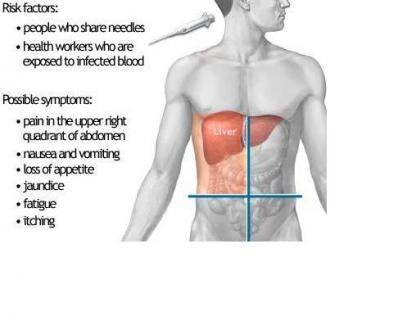
Hepatitis is an infectious disease characterized by inflammation and degeneration of hepatic cells.
Hepatitis can be caused by:
Immune cells in the body attacking the liver and causing autoimmune hepatitis
Infections from viruses (such as hepatitis A, B, or C), bacteria, or parasites
Liver damage from alcohol, poisonous mushrooms, or other poisons
Medications, such as an overdose of acetaminophen,which can be deadly
For more information about the causes and risk factors for different types of hepatitis, see also:
- Alcoholic hepatitis
- Autoimmune hepatitis
- Delta Agent(hepatitis D)
- Drug induced hepatitis
- Hepatitis A
- Hepatitis B
- Hepatitis C
Liver disease can also be caused by inherited disorders such as Cystic Fibrosis or hemochromatosis ,a condition that involves having too much iron in your body (the excess iron deposits in the liver).
Other causes include Wilson,s disease.
Symptoms
Hepatitis may start and get better quickly (acute hepatitis), or cause long-term disease (chronic hepatitis). In some instances, it may lead to liver damage, liver failure, or even liver cancer.
How severe hepatitis is depends on many factors, including the cause of the liver damage and any illnesses you have. Hepatitis A, for example, is usually short-term and does not lead to chronic liver problems.
The symptoms of hepatitis include:
Dark urine and pale or Clay colored stools
- Fatigue
Fever, usually low-grade
General itching
Jaundice (yellowing of the skin or eyes)
- Loss of appetite
- Nausea and vomiting
Weight loss
Patients of infective jaundice may suffer from any of the four forms of disease:
a) Mild Hepatitis - All characteristic symptoms may not be present. Usually no jaundice seen, only biochemical test confirm.Slight increase in conjugated serum bilurubin.
b) Moderate Hepatitis - Most common form where preicteric and icteric stages are seen.
c) Acute Hepatitis - Acute necrosis of liver cells. Condition is very rare and can be fatal.
d) Chronic Hepatitis- If timely treatment is not given any of the hepatitis can become chronic. Progressive damage to liver cells may occur leading to cirrhosis.
Treatment
Adequate rest with dietary modification.
Dietary Management:
In the following dietary modification are recommended-
Energy: A high energy intake is needed to promote weight gain and to ensure maximum protein utilization.
Protein: In acute cases with extensive liver damage the protein intake has to be decreased even below normal. It is important to provide proteins of high biological value for their maximum utilization.
Carbohydrate: a high intake of carbohydrate to protect liver from fatty liver infiltration is recommended. Simple carbohydrates like glucose,sugar,honey,fruits etc. can be used.
Fats: Fat intake should be decrease because it,s digestion and absorption is affected. Emulsified fat such as milk and eggs should be given.
Minerals: The diet should provide all minerals, particularly calcium and iron,in adequate amounts in view of the increased tissue catabolism.
Vitamins: Vitamins A, B complex,C and K particularly need attention.
Foods Recommended:
-simple carbohydrates like glucose,sugar,honey and starches from cereals and root vegetables.
-fruits, Fruits juices and squashes.
-Milk and milk products.
-Eggs,poultry etc
-Vegetables excluding strongly flavored ones. Carotene rich like dark green leafy,deep yellow and orange ones.
-Coconut oil is better tolerated
Foods restricted:
Fried ,fatty acids,nuts,oil seeds,meat and meat products,strongly flavored vegetables,cooking salt,baking powder,preserved foods and food contain salt as in pickles,preservatives etc.